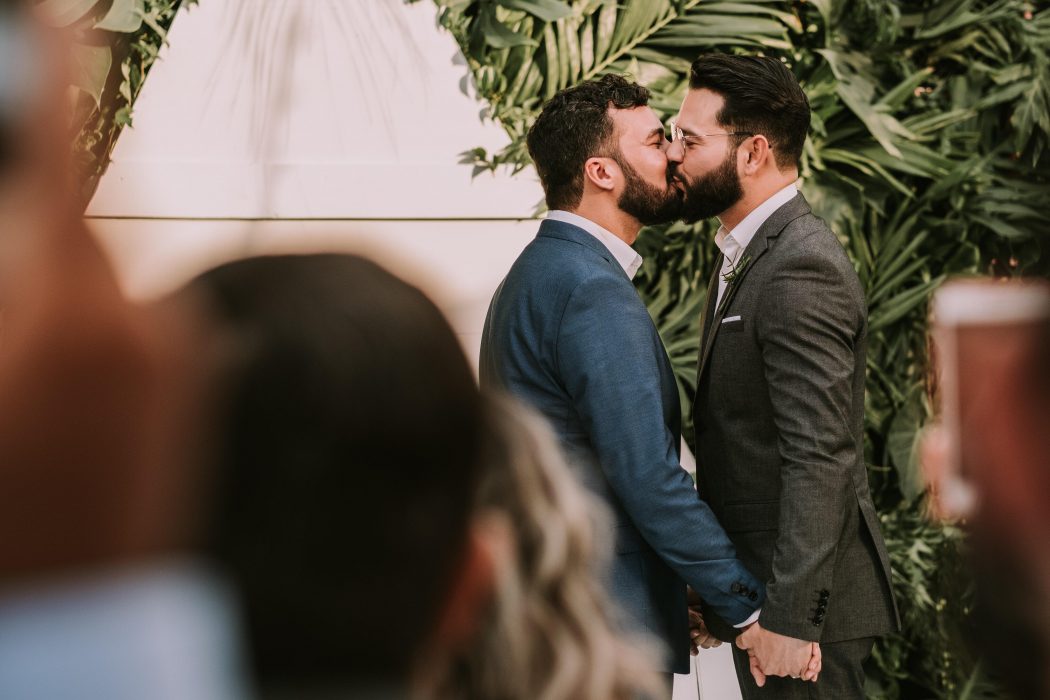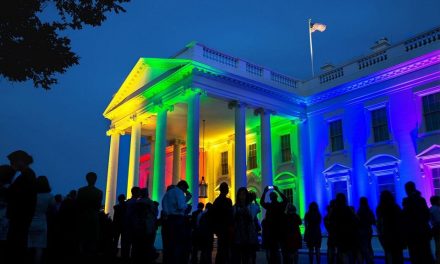(Photo Credits: Wallace Araujo from Pexels)
Can the 2015 Obergefell v. Hodges decision—the case that legalized gay marriage in the United States—be overturned?
The possibility that same sex marriage can be overturned in the near future has been laid bare last Monday when Supreme Court Justices Clarence Thomas and Samuel Alito released a statement saying that marriage equality “threatens religious liberty.”
The statement came as the Supreme Court rejected to hear the appeal of former Kentucky clerk Kim Davis. Davis was incarcerated way back in 2015 for refusing to issue marriage licenses to same-sex couples after they won the right to marry nationwide.
As a result, Davis had been sued for damages by couples David Ermold and David Moore as well as James Yates and Will Smith. Davis, however, argued that she is entitled to qualified immunity because she was a government employee at the time which means she was protected from civil suits like the ones filed by the aforementioned gay couples.
While Alito and Thomas agreed with the decision not to hear Davis’s case, their statement saying that the “court had ‘bypassed the democratic process’ and left those with religious objections to same-sex marriage ‘in the lurch'” alarmed many in the LGBT community.
Alito said:
As a result of this Court’s alteration of the Constitution, Davis found herself faced with a choice between her religious beliefs and her job. When she chose to follow her faith, and without any statutory protection of her religious beliefs, she was sued almost immediately for violating the constitutional rights of same-sex couples. Davis may have been one of the first victims of this Court’s cavalier treatment of religion in its Obergefell decision, but she will not be the last. Due to Obergefell, those with sincerely held religious beliefs concerning marriage will find it increasingly difficult to participate in society without running afoul of Obergefell and its effect on other antidiscrimination laws.
Further, Alito’s statement reads:
In Obergefell v. Hodges … the Court read a right to same-sex marriage into the Fourteenth Amendment, even though that right is found nowhere in the text. Several Members of the Court noted that the Court’s decision would threaten the religious liberty of the many Americans who believe that marriage is a sacred institution between one man and one woman. If the States had been allowed to resolve this question through legislation, they could have included accommodations for those who hold these religious beliefs. … The Court, however, bypassed that democratic process. Worse still, though it briefly acknowledged that those with sincerely held religious objections to same-sex marriage are often ‘decent and honorable,’ … the Court went on to suggest that those beliefs espoused a bigoted worldview.
For his part, Thomas said he agreed with the rejection of Davis’s appeal because “this petition implicates important questions about the scope of our decision in Obergefell, but it does not cleanly present them.”
Thomas added, “Nevertheless, this petition provides a stark reminder of the consequences of Obergefell. By choosing to privilege a novel constitutional right over the religious liberty interests explicitly protected in the First Amendment, and by doing so undemocratically, the Court has created a problem that only it can fix. Until then, Obergefell will continue to have ‘ruinous consequences for religious liberty.'”
Meanwhile, James Esseks condemned Justices Thomas and Alito’s statements during an interview with The Guardian. Esseks, who is the director of the American Civil Liberties Union (ACLU) LGBT and HIV Project, said, “It is appalling that five years after the historic decision in Obergefell, two justices still consider same-sex couples less worthy of marriage than other couples.”
He added, “When you do a job on behalf of the government – as an employee or a contractor – there is no license to discriminate or turn people away because they do not meet religious criteria.”
Further, Esseks vowed, “We will fight against any attempts to open the door to legalized discrimination against LGBTQ people.”
Esseks also told The Guardian that Thomas’s and Alito’s statement is just “a preview of what some justices’ views are.” He said he does not believe it will end marriage equality because “the freedom to marry has become part of American culture.'” Esseks, however, fear that “same-sex marriages could be treated differently.” Read the story in full here and here.
Netizens, of course, have taken to the social media to react about the news:
Just a reminder that overturning #Obergefell (gay marriage) is in the Republican Party’s official platform. Alito and Thomas just signaled their wishes to overturn it and we already know where Barrett stands on the issue. Please vote.
— Chasten Buttigieg (@Chasten) October 5, 2020
Marriage equality is the law of the land no matter where you live, and we’re not going back.
— Chris Pappas (@ChrisPappasNH) October 5, 2020
The Senate must reject any nominee who would side with Alito and Thomas and vote to overturn #Obergefell. https://t.co/CzyvvfoPJY
White gays who vote Republican, I don’t know how many times you need to be told this…
— Cody (@CodySDax) October 5, 2020
THEY DON’T CARE ABOUT YOU! #Obergefell
Folks, #AmyConeyBarrett would overturn #Obergefell & #RoevsWade in a heartbeat, becoz she doesn’t see it as an Equal Rights issue just a Substantive Due Process,so hands off! #FourteenthAmendment fights against all laws creating Unequal Civil Rights! #cnn #msnbc #foxnews #scotus pic.twitter.com/c3q3uMSskp
— #NeedANewCommanderInChief (@LethimTakeFifth) September 26, 2020










When Same-Sex Marriages were legalized, all employees of local, state and federal employees were/are obligated to obey the law. A person’s religious beliefs can be equal but not greater than the law as the Constitution clearly delineates the seperation of Church & State. Those who professed “Religious Beliefs” were/are using their beliefs to practice Intolerance. Issuing a marriage license for any couple, regardless of sex, is a legal right and mandate… unless otherwise unlawful, and must be issued. If religious beliefs compete or supersede civil rights, then the person/persons whose beliefs are constricted, can change jobs or simply comply. Such… Read more »
“…as the Constitution clearly delineates the seperation of Church & State”.
You show me where it says that in the Constitution.
Dave R:
This may qualify my statement…
“Separation of church and state” is paraphrased from Thomas Jefferson and used by others in expressing an understanding of the intent and function of the Establishment Clause and Free Exercise Clause of the First Amendment to the United States Constitution which reads: “Congress shall make no law respecting an establishment of religion, or prohibiting the free exercise thereof…”
According to DOL.GOV, in terms of the Supreme Court nominee,
“Religious Discrimination and Accommodation in the Federal Workplace. Title VII of the Civil Rights Act of 1964 (Title VII) prohibits federal agencies from discriminating against employees or applicants for employment because of their religious beliefs in hiring, firing and other terms and conditions of employment.”
Wow. I find it quite interesting that Justice Thomas is seeking to overturn Marriage Equality. He was able to marry his white wife because of the Supreme Court ruling on Loving vs. Virginia in 1967.
I guess he feels I got mine I don’t give a rat’s ass about LGBTQ people legally marrying.
If Trump gets reelected we can look forward to any number of prior rulings being overturned.
Please VOTE!
Right, him and his “high-tech lynching” uncle-tom, white-whooped and hypocritical.
This is beyond infuriating. Jesus said nothing about gay people in The Bible; nothing, yet they use religion as a weapon. If Kim Davis, or anyone else, doesn’t (didn’t in her case) want to issue marriage licenses for same-sex couples then she should quit and get a different job. We call ourselves the greatest country in the world yet here we are fighting, yet again, for equality.
This is hatred disguised as legality.
To start off if this isn’t posted it’s cuz the moderator chose not to post yes it’s the truth But So do I get this ?? So we’re gonna appoint this skagg Barret who’s right wing pro life /anti gay to a potential justice in SCOTUS to take away rights based on her views and those of Thomas and Alita And I’m sorry sweet heart but not everyone wants ,nor has 7 kids , To you that’s by your choice just like it’s my choice to be with a guy and marry him if I do choose and as long… Read more »
Lord I live in an alternate universe where there are a number of white gay Republicans. They don’t believe in the virus. Climate change is not a thing. Some don’t believe in gay marriage. Good old south Georgia.
Has Clarence Thomas forgotten that in the past, it would have been illegal for him to marry his caucasian wife?
Legislation from the bench is always bad, no matter if one agrees with the outcome or not.
Oh well. It’s not like I was going to find anyone that wanted a monogamist, relationship of substance anyways. It’s only when anti-sodomy laws are reinstated that gay men will give a fuck.
So true, “you don’t miss your water till your well runs dry.”
Another misguided interpretation by adam4adams blog. The court did not change any rights previously passed by the 2015 decision. It refused to hear a case that would actually have forced them to answer whether forcing same sex partnerships to be classified as marriage is contradictory to religious freedom gautssntees. By not hearing this case, Hay Marriage remains legally valid while ales leave religious groups with less freedom
M Jens: Perhaps the stickler is using the word “Marraige” instead of “Partner”? I tend to think that if I wanted my union with another male to be sanctified, I would be happy with both a legal and societal acknowledgement that I have a “Partner.” Perhaps, what sets off the “Religious” is Marraige and not Partner? Both signify a legal and social reconizition of togetherness. Society is what it is and perhaps, Marriage” might not have been the best choice? Hence, “Partner” seems to do the trick but does not invoke the Husband/Wife routine? It is not always expiditious to… Read more »
Kasper, your post seems to boil down to one simple, out of date phrase that used to be tossed around: “Separate, but equal.” That’s a dichotomy that doesn’t work. Semantics can be harmful.
Brad:
Would you have preferred, “Seperate, but equivilant”?
The dichotomy that you wrote that doesn’t work, is The Democrap’s Mantra; hence, it is not antiquated; It is, simply bullshit?
Donald Trump and republican conservatives continue to show clearly who they really are in regard to inequality. I noticed gays on here continue to support and defend them aggressively. The LGBTQ and black community should be fighting the hardest, hand in hand for equality and discrimination. This subject is timely as election time get nearer. Don’t forget who you are guys and who’s against you!!!!!They hate you for who you are as much as they hate me because of the color of my skin. Republicans are trying to stack the Supreme Court to keep US in OUR place!!!!
Yeah, but you know what, Matt, I was watching PBS one afternoon, and there were these black women who had relatives who fought on the side on the confederate! Needless to say, my jaw hit he floor at that fact, what’s more, these idiots were proud of them! Can you imagine, fighting to remain in chattel slavery? I guess they never saw the movie “Amistad” nor any other graphic depiction of the true stories of the horror and evil. They’ll have themselves to blame.
Kim Davis’s job is to to issue marriage licenses. It is not her job to judge who who should receive a license to marry. If the right to marry law is repealed where does it it leave religions that want to officiate over same sex marriage ceremonies? If Davis religion believes one can only marry in their own religion could she refuse an Episcopalian from marrying a born again Christian? Of course not. Judgement is not what she is paid to do. How she feels about who is entitled to marry does not grant her the authority to do anything… Read more »
All that was needed in the Kim Davis case was for her to be able to step aside and have someone else in authority issue at the license. Then, beliefs in marriage freedom and religious beliefs could both have been accommodated
I agree with ‘Cody’ “they don’t care about you!” They’re only using you to further their cause, you’re trying to appease/be part of a group of ‘haters’ of whom you’ll NEVER measure up to. You’re programmed, your minds are hacked. Being “white” in this case, is not going to give you a pass, you’re a minority, a fringe-group. . . anything but worthy of total and complete freedom from oppression, better wake-up!
Let’s say it louder bruh!!! “THEY DON’T CARE ABOUT YOU!!!!!!!!” Trump conservative white christians will never accept LGBTQ and take you guys serious. You’re a minority. Open your eyes and think about it before you try to defend him just because he looks like you…….(family). lol
This is just more media-fed hysteria. Read: https://getoutspoken.com/news/why-same-sex-marriage-will-never-be-overturned-despite-media-fear-mongering
All of that is hypothetical, an none is enshrined in law. Historically we know that Supreme Court overturned its earlier decisions despite precedents and burdens.
The decision in Obergefell vs Hodges was itself an overruling of an earlier precedent. Brown vs. Board of Education (racial segregation is unconstititutional) was an overturning of an earlier Supreme Court decision, and did cause all sorts of burdens — none of that prevented the earlier decision from being overturned.
No, at the rate we’re going (backwards in terms of civilized) you’ll find out what hysteria really is.
Hey, Thomas! Why don’t we also overturn 13 to get you back in the fields? How does marriage equality attack your religious superstition or interfere in any way with your hatred? Live and let live, as long as we’re not causing harm. YOU ARE CAUSING HARM! But praise Jesus, right? The war you’ve feared is here because you’ve forced us into defending ourselves.You started it. We will engage (it’s the only language you understand) and we will finish it.
Actually, they want us to just disappear, so it’s worse than that. As I told a Mexican man, “you’re the new n****r, they want ‘us’ to be basically extinct; murder us out of existence. Just put down the garden-tools, leaf-blowers and aspire towards higher asperations (power) and see what happens, I dare you.”
Ur nuts. NO ONE is trying to make any minority disappear, including gays and lesbians. No one is oppressing you, forcing you to do anything against ur will… You have alot of freedom in this country, much more so than in many of the dictatorships around the world, including socialist and communist nations. That’s what the Democrats and the media are trying to turn the country into. Ur belief in this oppression u keep peddling is a false one being pushed by liberals and the media to cause division and basically control you and alot of other people. Listen to… Read more »
OK, ACTUALLY THE GAYS WHO VOTE REPUBLICAN ARE TOTALLY RESPONSIBLE FOR THIS. there of course is NOTHING in the constitution describing ”marriage” gay or straight. yet these goons in the supreme court say GAY MARRIAGE ”THREATENS” RELIGIOUS FREEDOM.THIS IS SO OUTRAGEOUS,SUCH GARBAGE, WHERE IN OUR LAWS DOES IT SAYS ”RELIGIOUS FREEDOM” WOULD BE THREATENED, THERE IS NO ”RELIGION” GOVERNING US THERE,THESE PEOPLE WANT TO CHANGE THE VERY CONSTITUTION AND IT’S LAWS. and also why are trillions of dollars spent fighting prostitution, THERE IS NOTHING PROHIBITING IT EITHER,WHAT A WASTE OF MONEY. . THE REPUBLICANS SINCE 66 HAVE HAD A SENATOR,CONGRESSMAN… Read more »
As a bisexual man, I don’t mind gays/lesbians marrying one another, I just can’t stand them being in everyone’s face about their right to do it. And we don’t even know definitely if Barrett or Thomas are going to strike down gay marriage. Everyone needs to calm down and think clearly and be less emotional until we have more information about how SCOTUS will rule on this issue. This coud just be fear mongering by the liberal, Trump-hating media… That’s what they’re good at.
Where are they calling to end gay marriage? Alito’s comments quoted in the article simply state that the question should have been resolved through the legislative branch of government, not the judicial branch. They appear simply to be questioning the impact to the right of religious liberty, which is guaranteed in the constitution.
Justice Thomas better sit this one out….it wasn’t long ago that he would be prohibited from marrying the (white) woman of his choice. Marriage in the U.S. is a civil contract between consenting, eligible parties. There is no mandate for any religious/church sanction. There is no such thing as “gay” or “straight” marriage… marriage is marriage is marriage.